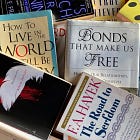Meditations Session 4: Becoming a Truth Extremist
Why do you persist “in doing worse than your best?”
Here’s a scene from the beginning of a dental procedure I was not relishing:
Me to specialist: “So, are you feeling it today?”
Specialist: “I’m always feeling it.”
Me: “You’re a pro.”
Specialist: “I focus on what I’m doing and start to feel it.”
What that specialist knows about focus is simple and easy to practice. And it is timeless wisdom. Marcus Aurelius knew it 2000 years ago. Amateurs get sidetracked by their feelings, which are driven by their thinking. Pros understand that any distracting feelings or thoughts will melt away by the power of their focus.
In Notebook 5.1, Marcus reminded himself:
At dawn, when you’re reluctant to get up, have this thought readily available: I have work to do as a human being, and that’s why I’m getting up. Do I still resent it if I’m on my way to do the work for which I was born and for the sake of which I was brought into the world? Or is this what I was made for, to lie in bed and keep myself warm? “But it’s really nice.” So is pleasure what you were born for? And, in general, was it for feeling, not for doing?
Marcus, Waterfield tells us, meant that literally. So strong was his tendency not to be a pro that Marcus needed to read his advice repeatedly.
Why should we think we are any different? Perhaps it is not about getting out of bed, but another choice point in our day.
And then, in 5.1, Marcus delivers a zinger about why he wants to stay in bed: “The reason is that you don’t love yourself. If you did, you’d love your nature and its purpose.”
We love our ego’s self-concept more than our true identity. As we will see in Session 5, our ego’s self-concept is based on separation from Reality.
In 5.2, Marcus writes, “How easy it is to banish and erase every upsetting or unwelcome thought and gain immediate and complete tranquility!”
Of course, Marcus knew it wasn’t that easy. Meditations is a mind-training program that shows us that we don’t want to banish upsetting thoughts. I will talk more about why in the next Session, but I encourage you to think about why you can’t or don’t banish upsetting thoughts. Please consider leaving your ideas in the thread.
In 5.5, Marcus writes,
The qualities you can offer, then, are those that are entirely up to you: candor, dignity, endurance, indifference to pleasure, acceptance of your lot, frugality, kindness, self-reliance, unaffectedness, discretion, stateliness. Do you see how many you’re able to offer right now, without excusing yourself on the grounds of ineptitude and incompetence? And yet you persist, of your own free will, in doing worse than your best.
What excuses do you make up? Why do you persist “in doing worse than your best?”
I can't stress this enough: To be effective, you must answer these questions as a loving, neutral observer of yourself. The egoic part of your mind will answer in condemnatory tones and is determined to keep you stuck.
Recently, I was struck by Connie Morgan's use of the term "truth extremist.” Morgan was using the term to refer to external truths. She argued we should “Stop putting a ‘nuance bandaid’ on everything that makes [us] uncomfortable.”
Marcus, we can say, was an internal truth extremist for uncovering the many ways he tried to make the false into the truth in his personal life.
To use the metaphor of a fish not knowing he swims in water, we are not aware of the chronic dysfunctional thought patterns we swim in.
In Notebook 5, Marcus gives us many practical ways to become truth extremists.


